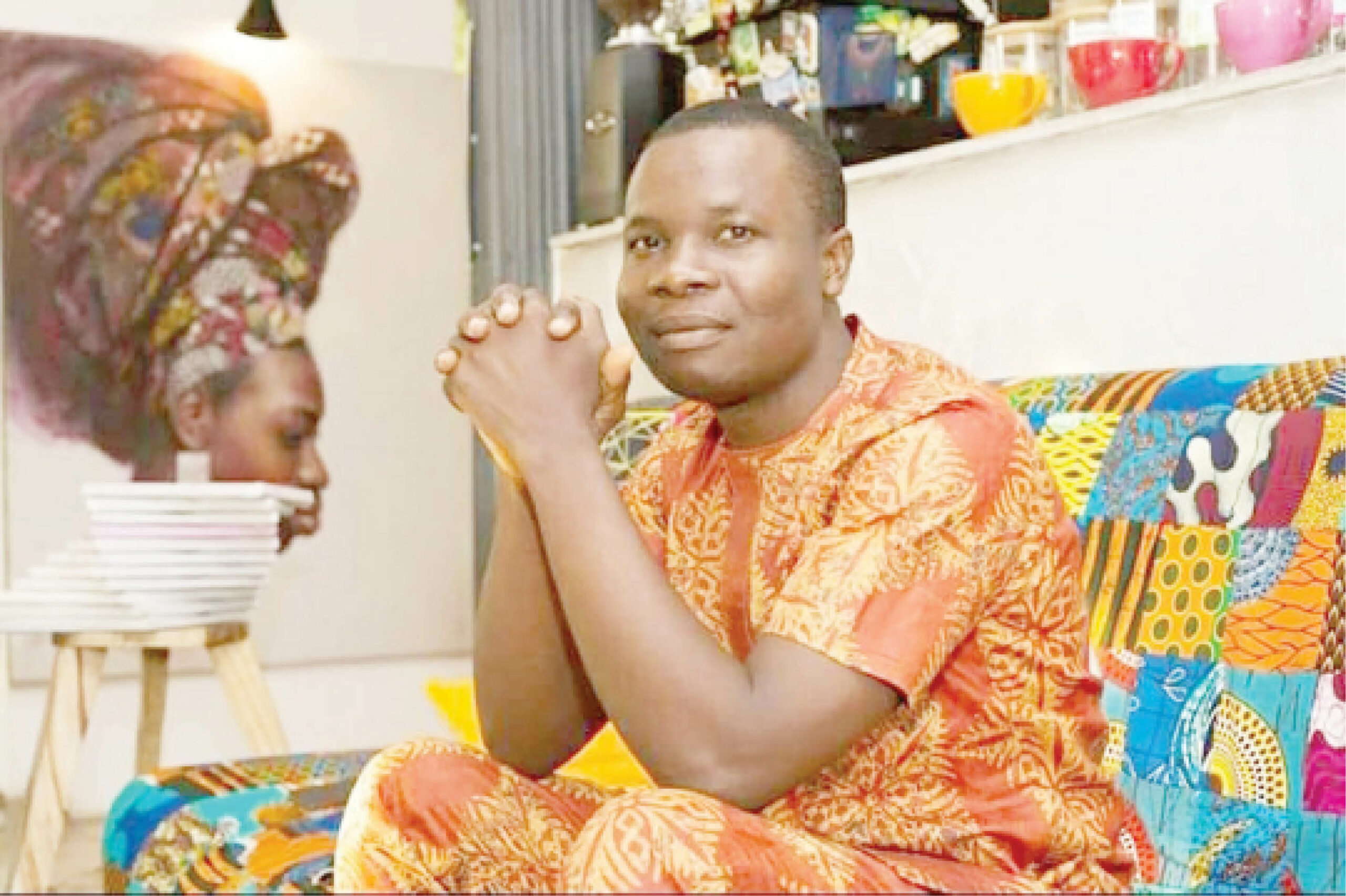I don’t want to be rich in grave like most artists – Abuja self-taught artist
Clement Nwafor is an Abuja-based self-taught artist. The Enugu-born artist said his educational background, having left school in secondary school, motivated him to aim higher. The award-winning artist, also married to an artist, speaks here about how he invented his gele-styled paintings and other issues around his works. Why art? I didn’t choose art; rather, […]

Clement Nwafor is an Abuja-based self-taught artist
Clement Nwafor is an Abuja-based self-taught artist. The Enugu-born artist said his educational background, having left school in secondary school, motivated him to aim higher. The award-winning artist, also married to an artist, speaks here about how he invented his gele-styled paintings and other issues around his works.
Why art?
I didn’t choose art; rather, art chose me. I can’t tell the year or how I started art, but I have always been drawing and practising art from childhood. Practising has helped, and it has been good; that is why I am still a fulltime studio artist.
- States differ over Buhari’s grazing routes directive
- After long silence, South East leaders condemn secessionist threats
As a fulltime studio artist, how have you been able to make ends meet as there are cases of some artists taking up other jobs to survive?
Most people believe the art profession is a poor one. That is why some artists are doing it partially and having side jobs that will help them pay their bills. Art is a lucrative profession and it is very good for me. The lockdown affected everything, but through the social media, I was able to survive.
Tell us about the exhibition that impacted on you so much?
I have participated in several exhibitions, both solo and group ones within and outside Nigeria. I have also attended other artists’ exhibitions. However, Tola Wewe’s APEWO Solo exhibition (2018) was really impacting because of the colour contrast in his works. Also, in London (2019) when I went for a group portrait exhibition in Brick Lane Gallery, the experience was exceptional. I visited many art galleries, but what I saw in the National Portrait Gallery opened my mind to colour, values and the effect of light in paintings.
Nigerian artists are faced with many challenges; how have you been able to tackle them?
I think it is a global challenge for every artist because I have come across several artists from different countries like London, Finland and Spain. Some artists face these challenges because they think doing the work only would feed them, without knowing that art is business. So I am trying to balance the two, which is not easy, anyway. The increase in prices of commodities has affected art materials, so I think artists should know how to balance that in terms of sales.
You are among the few artists that married a colleague, how have you been coping as couple?
We are great, and it is fun. We understand each other even more, and in our studio practice we encourage and criticise each other when necessary.
What do you think artists should do to remain relevant, considering the competitiveness of the profession?
They should practise constantly and invest in their arts. Passion and prosperity drive me. Passion is like my skeleton, while prosperity is like my flesh.
What do you think contributed to your success in the industry?
I am not yet successful, but I am looking forward to that. What contributed to the little I have now is my dream of being a rich artist while I am still alive. I don’t want to be like most artists who became very rich in the grave.

What inspires you?
Conscious music, my environment and seeing what other artists are doing inspire me a lot.
How have you been able to create a unique identity in the industry?
The gele style. The idea came from a lovely painting I did for a competition (Life in my City Art Festival, which the theme was riches within). I thought of fixing real Ankara materials I picked from a waste bin to my detailed painting to show how we can change waste to money, as well as Africa’s riches.
What can the government do to make the industry better in the country?
I don’t believe in what government can do for me or private organisations. I see whatever comes from them as politics. But a lot of individuals have been so helpful to the visual art industry in Nigeria.
Your education stopped at the secondary level, what does this say about you?
What I have achieved without being to art school has shown that nothing can stop me from achieving my goals
As a self-taught artist, how do you handle the competition?
In the art world, nobody knows who is who. I don’t think people ask for artist’s qualifications before they can buy their works. Most of the fulltime studio artists who went to school don’t even know where their certificate is. But some artists with degrees look down on people like us while some others respect us.
What are your plans for the future?
I plan to have a big art studio that is very suitable for my wife and me. I am still considering owning a gallery.
